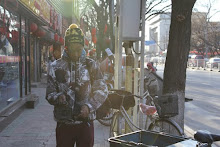Sino (part 1/2) from lebogang rasethaba on Vimeo.
Sino (Part 2/2) from lebogang rasethaba on Vimeo.
Hello,please tell us about the film, in your words, what is it about?
Sino is a short film about a co-incidental meeting between two Africans in Beijing, China. Through their interactions, the film deals with issues such as the challenges of resettlement and some of the complexities that ultimately arise from the xenophobic elements inherent in the Franco-phone-Anglophone exchange.
How is this story relevant in the world? (why make this film?)
Because its part of a larger global conversation about Africans writing their own history and telling their stories own through their perspective.
Why the name 'Sino'?
Sino is a prefix and it refers to relations with China.
The two main characters' experiences, are they in anyway resembled that of yours? I think the South African guy was maybe you...wrong?
Haha… everyone always asks me if the South African is me. No Sino is not a biopic, but the experiences of the characters are very real. Otherwise I wouldn’t have made a film about it.
I think its interesting that while it explores the experience of Africans living in China, yet through the displacement, it not only revealed how little China and Africa havent really interacted with eachother,( both have been engaging with the West for a long time) ; it also shown the mutual beef between South Africans and other Africans, in other words, xenophobia. where do you think this beef (xenophobia) comes from?
Xenophobia is something that is still mind-boggling for me, but I have made peace with my understanding of it. My point is, I think after ’94, a lot people expected change on all levels, with misguided ideas on how long it would take. So to this day, we are still waiting for jobs and housing, and when people from other parts of Africa come to South Africa and do the crappy jobs we don’t want, because, “ how can I still be a street sweeper now if I was street sweeper then?” (I mean that general attitude is quite pervasive amongst South Africans right? As in, a sense of entitlement or awaiting a reward, particularly after being the victims of Apartheid?). And so it’s really infuriating for us, and we take out a lot of our frustrations on people from other parts of Africans. That’s just one aspect though, this topic is very complex.
So when we last discussed while in China, you mentioned that it was a Trilogy, and this is only Part I. any hint on the direction its going for the next two parts?
Yeah, totally. Part 2 is going to be wild. I’m gonna act in it, which still kinda freaks me out a little. The pre-production is all done; I just need to finish up current projects and start shooting really. I have been making notes for part 3 for a while now. All 3 movies deal with the same subject matter, which is, the African Diaspora living in Beijing. There are recurring characters who play the same roles, for example, Dubois is also in part 2 but only has a cameo. In part 2 I have a central role, but I only feature a little in part 3. I wouldn’t say the movies are sequential, but they are related and well connected in their principles and sensibilities.
On filmmaking, what is your preferred style/preferences/references?
That totally depends on context. Different people do different things really well, like Errol Morris, for example, makes great documentaries, but I wouldn’t say his commercials are as inspiring, you know what I mean? Let me give you a “for instance”. For the next part in the trilogy, as part of the pre-production, I watched a lot of older Wang Kar Wai’s movies , just because of how many “perfect shots” there are in movies like “Chunking express” or “Days of being Wild”. For Sino, I watched Borom Saret over and over again. It’s a little circumstantial. Now when I watch “Sino” and I can easily admit that technically it is quite average, but when I was working on it, that didn’t matter. I just needed to make it. But now I want to pay more attention to things like getting the “perfect shot”.
What are your favorite things about film making?
I guess it would have to be the privilege and gift of been able to share precious things, which I care about and I know other people care about, and creating a space where we can enjoy and honor those things together.
What are your top four favorite films?
I promised myself I would never answer questions like that. But off the top of my head, the four films that have had the biggest impact on me recently are; Diaspora by Claire Denis, Borom Saret by Ousmane Sembene, Sans Soleil by Chris Marker, and “Burden of dreams” by Les banks. But this selection is very specific to whats going on around me now, if you asked me again in a month it would probably be different.
What has Bei Jing taught you?
Street Chinese
What can 2010 learn from 1990?
Textbook Chinese
Which book/s changed your life?
Chinese for beginners. Just kidding. These questions always do my head in…er, again just off the top of my head; Diceman (Luke Rhinehart), I write what I like (Steve Biko), letter to father (Franz Kafka) and 1984 (George Orwell)
what, to you, is the key to communicating visually?
Honesty
Who are the top four directors that inspire you?
You killing me. Er, let me think, Ousmane Sembene , Errol Morris, Werner Hertzog, Spike Jonze
What's the most beautiful thing you have ever seen?
Once my family and I all went had just come back from an exhausting family holiday, and we were all insanely jetlagged and we all stayed up late watching some Nollywood omnibus, and we were nibbling on something (dried fruits, pop-corn, chicken wings maybe? I cant remember) and anyway, the sight of it all was a little too surreal and a little too perfect.
Other stuff Lebo has shot...Freshlyground in BeiJing, Damon Dash, DJ Wordy, and BeiJing Rap group IN3. Go to his Vimeo Space for more.
high five lebo!















2 comments:
We waited with bated breath, and it was perfect. well done. lovely interview. x
Post a Comment